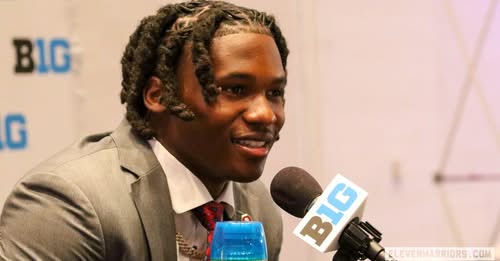Jeremiah Smith’s journey to Ohio State wasn’t defined by hype or headlines alone. It was shaped by a lifetime of competition, a relentless drive to be better than the day before, and an unwavering belief that greatness is earned, not given. Long before he became a household name in recruiting circles and a potential cornerstone for one of college football’s most prestigious programs, Smith was already testing himself against older players, steeper odds, and ever-higher expectations. Raised in South Florida—a region known for producing some of the nation’s most explosive football talent—Smith’s early environment was saturated with elite athletes and unforgiving standards. He didn’t just learn to compete; he learned to thrive within chaos. Whether it was playing backyard football against older cousins or proving himself on the practice field as an underclassman, Jeremiah was always the one looking to raise the bar, never satisfied with just being good. He wanted to be special.
His natural abilities were obvious even in elementary school. Coaches and teachers noticed he moved differently, thought faster, and absorbed instruction like a sponge. By the time he reached middle school, Smith was already training like a high school varsity athlete. Speed, agility, and footwork drills weren’t optional—they were part of his routine. His father, recognizing his son’s potential, kept him focused but grounded, often reminding him that talent opens doors, but work ethic decides whether you get to stay inside. Smith took those words seriously. While most kids his age were navigating adolescence, Smith was navigating double-coverage, breaking down defensive alignments, and asking his coaches for extra reps after practice.
What truly set him apart wasn’t just his skill set—it was his approach. Smith didn’t just want to win; he wanted to dominate. He wanted to leave no doubt. That mindset made him a nightmare for opposing defensive backs and a coach’s dream. His route-running precision, ability to high-point the football, and knack for creating separation became his trademarks by the time he was in ninth grade. As a freshman at Chaminade-Madonna Prep, one of Florida’s premier football programs, he didn’t just blend in—he stood out. Facing elite talent week in and week out, he never flinched. Coaches remember him walking into the locker room before big games like he was preparing for a walk in the park. Confidence exuded from him, but it was never arrogance. He had already put in the work. He knew what he could do.
Off the field, Smith carried himself with a maturity that belied his age. He understood the sacrifices that came with greatness. There were missed parties, grueling training sessions, and countless nights spent watching film when others were scrolling through social media. For Smith, the path was clear. If you want to be the best, you have to outwork everyone—consistently, quietly, and without shortcuts. That philosophy became his compass. His high school coaches often used him as an example for younger players, pointing to him as the standard. “You want to know what commitment looks like?” they’d say. “Watch Jeremiah.”
Recruiters took notice, and it didn’t take long for offers to pour in from across the country. Alabama, Georgia, USC, LSU—all the blue bloods came knocking. But when Ohio State called, it felt different. The Buckeyes didn’t just offer him a scholarship; they offered a vision. Wide receiver coach Brian Hartline had developed a reputation for molding elite talents into NFL-ready weapons. From Garrett Wilson to Chris Olave to Marvin Harrison Jr., Hartline had built a pipeline. And Smith, never one to shy away from high standards, saw an opportunity to join the next wave of greatness. He committed to Ohio State knowing full well what it would take to stand out in a receiver room that could rival most NFL units.
By the time he stepped on campus in Columbus, expectations were sky-high. Yet again, Smith didn’t shrink from the spotlight—he welcomed it. He arrived early, enrolled in classes, and immediately dove into winter workouts. Veteran players quickly took notice of the freshman who wasn’t acting like a freshman. He studied the playbook with the intensity of a grad student, asked intelligent questions in meetings, and pushed himself to the limit during drills. Every sprint was a race. Every rep had a purpose. He was competing—not just against others, but against the version of himself from yesterday.
The coaching staff, already impressed with his high school tape, saw even more during spring practices. He wasn’t just physically gifted—he was cerebral. He understood leverage, how to manipulate defenders with subtle movements, and how to time his breaks so precisely that corners looked frozen. His catch radius and body control turned 50-50 balls into 80-20 advantages. More importantly, he listened. He wasn’t above criticism. If Hartline corrected him, Smith would nod, internalize the feedback, and immediately implement the change on the next rep. That teachability, combined with his innate athleticism, made him a lock for early playing time.
As summer workouts rolled into fall camp, whispers began to grow louder: Jeremiah Smith wasn’t just another highly rated freshman—he might be the real deal. Teammates began calling him a “future Sunday player.” Coaches said he was one of the most advanced first-year receivers they’d ever seen. But even amidst the praise, Smith never let his foot off the gas. He knew that being good in July meant nothing if you couldn’t back it up under the lights in October. So he kept pushing. Extra film sessions with quarterbacks. Catching drills after practice. Shadowing veterans like Emeka Egbuka and picking their brains on how to prepare for Big Ten defenses.
When the season finally kicked off, the world got to see what the Buckeyes had been witnessing behind closed doors. Smith didn’t just belong on the field—he looked like he owned it. In his debut game, he hauled in multiple receptions, showcasing a blend of polish and explosiveness rarely seen in players his age. Commentators raved about his footwork, his poise, and his ability to adjust mid-route. Fans buzzed with excitement, speculating whether he could be the next freshman phenom to leave a legacy in Columbus. But Smith wasn’t listening to the noise. He was watching film. He was planning for the next opponent. He was still competing.
That theme—constant competition—remains the heartbeat of Jeremiah Smith’s story. He competes in the weight room, where he tries to match the veterans lift for lift. He competes in meetings, trying to anticipate what the coaches will ask before they say it. He competes during practice, where every rep is treated like a fourth-quarter play. But perhaps most importantly, he competes with the younger version of himself. The kid who trained in the Florida sun while others rested. The teen who turned down instant fame to embrace long-term development. The freshman who chose Ohio State not because it would be easy, but because it would demand the best of him every day.
Smith knows that football is more than just a game. It’s a lifestyle, a series of decisions made in the shadows that manifest under stadium lights. He understands that potential is meaningless without production, and that being a five-star recruit doesn’t guarantee five-star results. So he grinds. Quietly. Consistently. And with the kind of discipline that turns talent into legacy. Every route he runs, every pass he catches, every block he throws is part of a larger mission—to become one of the greatest to ever wear the scarlet and gray.
Ohio State fans have every reason to be excited. Jeremiah Smith represents more than just a promising wide receiver. He represents the program’s future. A player who embodies the values of toughness, discipline, and excellence. A competitor who doesn’t flinch under pressure. A young man who has been sharpening his edge since childhood and is now ready to wield it on college football’s biggest stages.
In a sport defined by inches and split seconds, it’s the mindset that often separates the good from the great. And in Jeremiah Smith’s case, that mindset was forged not in the limelight, but in the quiet battles no one saw—against older brothers, tougher defenders, and the voice in his head that always asked, “Can you be better today?” So far, the answer has always been yes. And if history is any indicator, Jeremiah Smith’s next chapter at Ohio State is just getting started.



